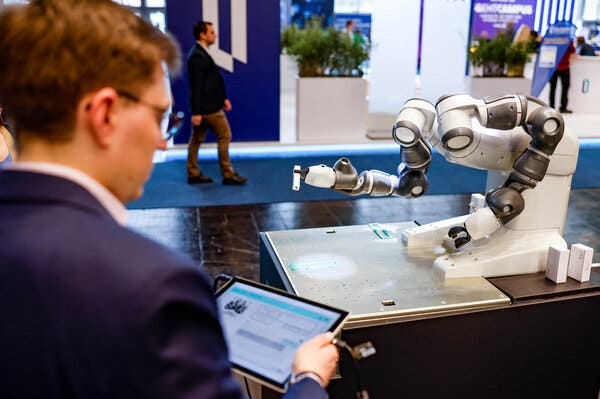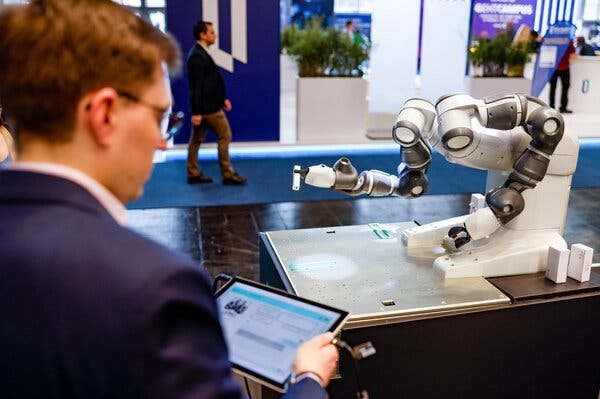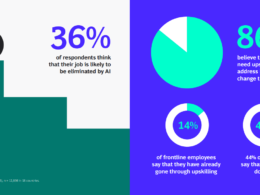the health strategist
institute for health strategy, digital health
and continuous transformation
Joaquim Cardoso MSc
Chief Research and Strategy Officer (CRSO),
Editor in Chief and Senior Advisor
June 14, 2023
ONE PAGE SUMMARY
A report from McKinsey Global Institute reveals that generative artificial intelligence (A.I.) has the potential to contribute up to $4.4 trillion annually to the global economy.
- Generative A.I., including chatbots like ChatGPT, can automate tasks and save 60 to 70 percent of workers’ time, leading to increased productivity.
- The report predicts that between 2030 and 2060, 50% of all work will be automated, driven by the capabilities of generative A.I. tools.
- McKinsey’s previous forecast of A.I. automating 50% of work was revised due to the accelerated growth of generative A.I. tools.
Generative A.I. has the ability to augment individual workers’ capabilities by automating certain activities, transforming the nature of work.
- Silicon Valley is witnessing significant investment in generative A.I. technologies, including ChatGPT and Google’s Bard, sparking debates about their impact on jobs and the global economy.
Goldman Sachs warns that A.I. could cause worker disruption and benefit certain companies more than others.
- Studies indicate that generative A.I. can enhance the productivity of call center operators and have the potential to boost productivity by 35%.
However, some experts caution against overestimating the transformative power of generative A.I., highlighting that it is still in its early stages.
- Economic studies often overlook risks such as the spread of misinformation and loss of human control over generative A.I.
The majority of generative A.I.’s economic value is expected to come from automating tasks in customer operations, sales, software engineering, and research and development.
Challenges related to misleading and inaccurate content generated by generative A.I. need to be addressed by industry leaders and regulators.
The report concludes that the true transformation will lie in people, requiring innovation and leadership to effectively leverage the technology.
DEEP DIVE

Generative A.I. Can Add $4.4 Trillion in Value to Global Economy, Study Says
The report from McKinsey comes as a debate rages over the potential economic effects of A.I.-powered chatbots on labor and the economy.
New York Times
By Yiwen Lu — Yiwen Lu is a tech reporter in San Francisco.
June 14, 2023
Generative artificial intelligence” is set to add up to $4.4 trillion of value to the global economy annually, according to a report from McKinsey Global Institute, in what is one of the rosier predictions about the economic effects of the rapidly evolving technology.
Generative A.I., which includes chatbots such as ChatGPT that can generate text in response to prompts, can potentially boost productivity by saving 60 to 70 percent of workers’ time through automation of their work, according to the 68-page report, which was published early Wednesday. Half of all work will be automated between 2030 and 2060, the report said.
McKinsey had previously predicted that A.I. would automate half of all work between 2035 and 2075, but the power of generative A.I. tools — which exploded onto the tech scene late last year — accelerated the company’s forecast.
“Generative A.I. has the potential to change the anatomy of work, augmenting the capabilities of individual workers by automating some of their individual activities,” the report said.

McKinsey’s report is one of the few so far to quantify the long-term impact of generative A.I. on the economy. The report arrives as Silicon Valley has been gripped by a fervor over generative A.I. tools like ChatGPT and Google’s Bard, with tech companies and venture capitalists investing billions of dollars in the technology.
The tools — some of which can also generate images and video, and carry on a conversation — have started a debate over how they will affect jobs and the world economy. Some experts have predicted that the A.I. will displace people from their work, while others have said the tools can augment individual productivity.
Last week, Goldman Sachs released a report warning that A.I. could lead to worker disruption and that some companies would benefit more from the technology than others. In April, a Stanford researcher and researchers at the Massachusetts Institute of Technology released a study showing that generative A.I. could boost the productivity of inexperienced call center operators by 35 percent.
Any conclusions about the technology’s effects may be premature. David Autor, a professor of economics at M.I.T. cautioned that generative A.I. was “not going to be as miraculous as people claim.”
“We are really, really in the early stage,” he added.

For the most part, economic studies of generative A.I. do not take into account other risks from the technology, such as whether it might spread misinformation and eventually escape the realm of human control.
The vast majority of generative A.I.’s economic value will most likely come from helping workers automate tasks in customer operations, sales, software engineering, and research and development, according to McKinsey’s report. Generative A.I. can create “superpowers” for high-skilled workers, said Lareina Yee, a McKinsey partner and an author of the report, because the technology can summarize and edit content.
“The most profound change we are going to see is the change to people, and that’s going to require far more innovation and leadership than the technology,” she said.
The report also outlined challenges that industry leaders and regulators would need to address with A.I., including concerns that the content generated by the tools can be misleading and inaccurate.
Ms. Yee acknowledged that the report was making prognostications about A.I.’s effects, but that “if you could capture even a third” of what the technology’s potential is, “it is pretty remarkable over the next five to 10 years.”
A version of this article appears in print on , Section B, Page 6 of the New York edition with the headline: A.I. Can Add $4.4 Trillion Worldwide, Report Says.
Originally published at https://www.nytimes.com on June 14, 2023.












